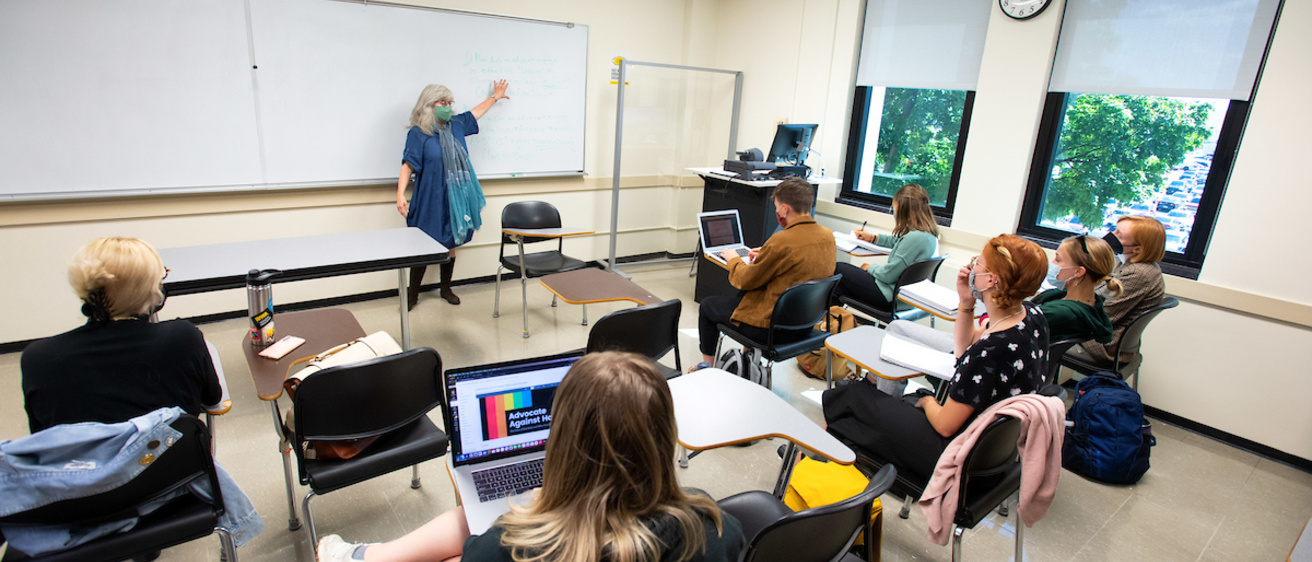Iowa Law students come from many undergraduate institutions and degree programs. Many people are surprised, however, to learn that a select group come having already earned a credential from the University of Iowa College of Law. Over the past several years, a small but steady flow of UI graduates have matriculated into law school having earned the College’s undergraduate Certificate in Human Rights offered through the Center for Human Rights. This unique opportunity has often been found to spark interest in students choosing to pursue the study of law.
The Certificate in Human Rights involves an integrated, specific course of study that includes an introduction to foundational concepts in human rights. With one of its main goals being to provide students preparation for a future in their professional career or field of study, students are taught to explore topics from inter-disciplinary perspectives, identify solutions to global challenges, translate foundational concepts into effective advocacy, and strengthen their ability to communicate with audiences. Not only is it beneficial for students who transition directly to a career following graduation, but it also well positions students bound for law school, professional, or graduate studies.
This Certificate is the only undergraduate credential program offered through the College of Law and its curriculum also doubles as the Human Rights Track for UI’s International Studies major.In addition to the Center’s own undergraduate “HRTS” courses, Certificate requirements include courses from theCollege of Liberal Arts and Sciences departments of History and Philosophy. Students enrolled in the Certificate program and HRTS classes come from undergraduate departments and majors across the University. Not surprisingly, more than half of them are considering law as a potential future path.
“The Human Rights Certificate program provides UI undergraduates with the unique opportunity to learn from and connect with law school faculty members. In many of our classes, students explore how legal norms are established, interpreted, and applied. They develop skills that prepare them extremely well for law school and other graduate study,” stated Brian Farrell, associate professor of instruction in the College Law who directs the certificate program.
Many of the certificate faulty members are lawyers with close ties to Iowa Law. Along with Professor Farrell (98JD), instructors include Amy Weismann (00JD), Stephanie Bowers (03JD), and Aaron Page, who, like Farrell, also teaches courses in the law school. The faculty takes pride in supporting certificate students and offers particular benefits to the many pre-law students who enroll in the certificate program.
“For me, one of the rewarding aspects of teaching in the certificate program has been talking with and mentoring undergraduates who are interested in law school and watching their progress as they go through law school and begin their careers. It’s particularly fun with the students who’ve gone on to Iowa Law because I often get to continue working with them over a period of five, six, or seven years,” stated Farrell.
Farrell regularly talks with students considering law and writes law school letters of recommendation, as he did for Johnny Molony, one of the certificate alumni who have continued on to Iowa Law. Molony, who graduates this spring, took Farrell’s Introduction to Human Rights course in Spring 2017. Five of the roughly thirty students in that that class went on to law school.
“The Human Rights Certificate program was invaluable in giving me the chance to get one-on-one mentoring from legal professionals, like Brian Farrell and Amy Weismann,” expressed Molony, “From giving me advice on internships, to helping me get involved in academic conferences like the Iowa Human Rights Research Conference, to writing letters of recommendation for me for law school applications, Brian and Amy were always there to mentor and guide me. They not only helped demystify the law school process for me, a first-generation law student, but also helped me in finding opportunities to apply myself while still in undergrad.”
Olivia Roberts is another of the certificate students who decided to pursue law school and is now in her second year at Iowa Law. “The Human Rights certificate shaped my future career, because it was confirmation that going to the law school was the right call. I truly believe that without this program I would not have had a realistic view of what it means to be an advocate,” expressed Roberts.
She added that the program’s Seminar in Human Rights Praxis, taught by Weismann, allowed her to understand the importance of advocacy.
“It gave me the opportunity to travel to Washington D.C. and lobby for an organization called Scholars at Risk on the Hill. It was an eye-opening experience to walk the halls of the Senate and House buildings and interact with its members. Through this class, I learned the importance of executive presence, anticipating questions, and advocacy. These skills are important in the law school setting because it prepares you for future interviews, cold-calls, and client-centered counseling/representation,” stated Roberts.
Following a similar path through the certificate program to Iowa Law, Efeoghene Ayanruoh also took the Praxis course. “The certificate provided a unique opportunity to get involved in advocacy on a different scale. Through the Human Rights Praxis course, I worked with Scholars at Risk––an organization devoted to protecting scholars across the globe whose lives and liberty are threatened–– to advocate on behalf of a scholar in Bahrain. This pivotal experience exposed me to human rights issues occurring across the globe and the resources to raise awareness of the issues domestically,” she expressed.
As a third-year law student, she realizes how beneficial the program was in helping her prepare for law school.
“As a law student, the Human Rights Certificate program enabled me to develop my critical thinking skills through the complex international and domestic human rights issues we tackled. Additionally, it helped me hone in on my ability to articulate creative solutions to real-world challenges, particularly through the Human Rights Praxis Course. Using this skill is one I have employed countlessly as a law student, especially during my summer internships and as a clinic law student,” stated Ayanruoh.
